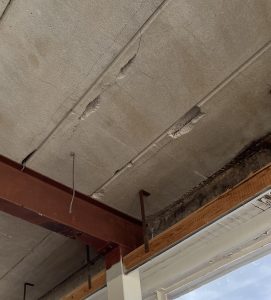Engineers at BSP have been providing expert advice on RAAC – Reinforced Autoclaved Aerated Concrete – for a number of key organisations in recent months.
This type of concrete has been in the news over the past few years after numerous examples of it failing.
With significant expertise in identifying RAAC and the potential problems it can lead to, BSP structural engineers can also provide advice on the best solution to overcome further difficulties.
Our clients who have contacted us to investigate whether they have RAAC in their buildings have included blue chip organisations in the science, engineering and health sectors, along with many schools and colleges.
What is RAAC?
BSP MD Carl Hilton said: “RAAC is a form of reinforced, lightweight concrete that was used as an alternative to traditional sand, cement and coarse aggregate mixes, generally in the pre-cast industry between the 1960s and 1990s.
“RAAC is formed from silica sand, cement, lime, water, and an expansion agent, which creates air bubbles, giving the material its unique properties. The concrete is then autoclaved, a process that involves curing it under heat and pressure, enhancing its strength and durability.
“It was used mainly in panel format for ‘flat’ roofs covering a range of buildings across the United Kingdom including schools, further education colleges, as well as commercial buildings.
“Steel tension reinforcement was used to give tensile strength of the panels, much in the same way as traditional reinforced concrete. However the aerated mix does not provide the same level of passive resistance to chloride ingress or carbonation. To overcome this, the reinforcing bars were coated with a protective material. However this material has been found to reduce the bond of the reinforcement within the aerated cementitious mixture – thus providing a material of significantly less strength than its traditional counterpart.”
Structures built with RAAC require regular inspections and maintenance to ensure their integrity and safety.
There have been a number of incidents where RAAC roofs have collapsed in buildings like schools, and this has led to many organisations and employers commissioning structural surveys to check on their properties.
BSP structural engineers are specialists in structural surveys and can provide expert advice on RAAC and situations where it is discovered.
Contact one of our offices in Leicester, Nottingham or Derby to find a structural engineer to survey any buildings with RAAC or that may feature RAAC. Contact details can be found here.


